Portugal Is At War With Itself Over ‘White Gold’
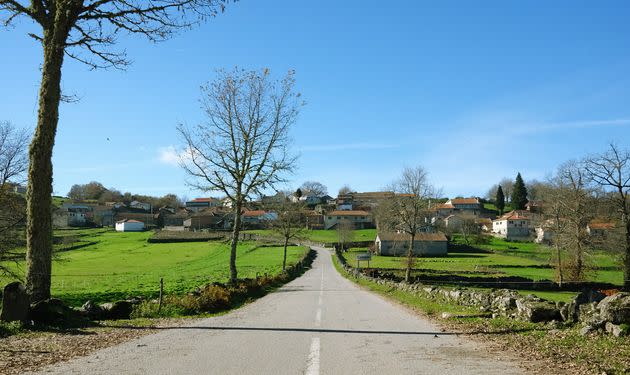
COVAS DO BARROSO, Portugal — For centuries, Aida Fernandes’ family has lived in this village nestled in the rugged mountains that crown the northern border with Spain, with generation after generation grazing cattle and growing grapes in lush green fields.
Then, in 2010, a wildfire — one of the growing number of blazes scorching this part of Europe as the climate changes — engulfed the verdant foothills encircling Fernandes’ ancient home.
The rustic stone houses and towering persimmon trees of Fernandes’ remote town of about 100 people remained intact, but there was plenty of damage to the surrounding area. With time, though, the wounded landscape healed. Dense stands of maritime pines regrew to cover the charred bare ridges. Enough Erica lusitanica, or Portuguese heath, sprouted between the skinny evergreens’ trunks to make the ground look like brushstrokes in an impressionist painting. Wild fruit trees returned, bearing juicy berries with red skin and yellow meat that locals call medronheiros and ferment into alcohol. The culture, too, showed signs of a rebound, as the region’s unique farming traditions and indigenous livestock breeds made it one of the only places in Europe to win a spot on a worldwide list of “agricultural heritage systems” worthy of conservation.
But around that same time, Fernandes registered a new threat to her land — one that, while slower-moving, could change things forever. It came not from a “what” but a “whom”: an invasion, with huge ramifications for Europe’s climate goals and Portugal’s political stability.
With the help of the national government, the lithium mining industry promises to transform this forgotten region into the European Union’s largest operation for digging the metal ― prized for its role in electric vehicles ― out of the earth. More prospectors were arriving by the month to bore cylindrical holes into rock and take samples. As time went on, Fernandes accused workers of trespassing on land where they had no legal rights, an allegation the mining company denied.
Seemingly overnight, Fernandes, 45, became the de facto leader of the resistance, a self-described David leading a ragtag coalition of farmers, environmentalists and itinerant hippies. They were up against the twin Goliaths of an international corporation and the Portuguese state, with backing from at least a handful of villagers who believed mining would mean a financial boost for themselves and their region.
One Friday in November, Fernandes’ new responsibility — an exhausting third job on top of farming and raising three kids — meant going on patrol to check whether the prospectors were advancing. Peering at the horizon through the dusty windshield of her red Toyota pickup, she spotted a single plume of white smoke. Fernandes let out something between a gasp and a sigh.
“They’re here,” she said.
Roughly 200 feet down the ridge, a crew of three hard-hatted workers made use of the waning daylight to dig a little deeper into the exposed rock, casting up a continuous puff of diesel exhaust and dust.
Men had been showing up on lands owned collectively by the villagers for months. Fernandes and her cohort tried blocking the road when they saw them coming, but this afternoon she was too late. More workers were coming more often, with armed police not far behind — an intimidating sight for residents who lived through the fascist dictatorship that ruled Portugal from the Great Depression until the 1970s.
The industry is in a Catch-22. Lithium is the main component in the power packs that propel electric vehicles and store energy from weather-dependent renewables, like wind and solar, for later use. Investors hoping to cash in on the transition from fossil fuels to batteries and electricity call it “white gold.”
Consumers in rich parts of Europe and North America demand products made with metals unearthed with minimal environmental damage, but have literally stood in the way of mines in countries with some of the highest regulatory standards in the world. Even under optimistic scenarios for how much metal recycling can recirculate into the battery supply chain, analysts say both continents need to mine more raw lithium ― and officials from Washington to Brussels are dangling new incentives for companies to do so. Yet Savannah Resources, the mining company pursuing the lithium under Covas do Barroso, finds itself fending off villagers’ lawsuits in local court in Portugal.
New legal cases “coupled with the increased stream of negative media coverage in the second half of the year are a cause for ongoing frustration,” Matthew King, Savannah Resources’ chairman, wrote in a year-end letter to investors in December. “However, we will continue to communicate the positive benefits of our project for the local community, Portugal and indeed Europe as a whole, and our efforts to minimise any and all negative impacts it may have.”
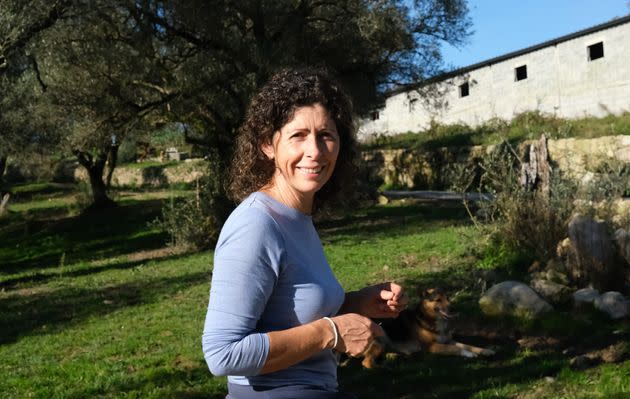
Tensions were growing. Temperatures were surging. Fernandes was staring down the plans that some of the world’s most powerful governments and financiers had for her tiny, ancient village. And time was running out. With final mining permits still pending, the only question was: For whom?
The Dawn Of Portugal’s Lithium Rush
There is a lot of “white gold” in the hills around Covas do Barroso. There’s enough, according to the British mining company paying the prospectors to drill rock samples of the landscape, to manufacture nearly 600,000 electric vehicles annually — more than three times the number of new cars sold in Portugal in a good year.
Someone just needs to dig the yellowish spodumene rocks out of the ground, cart them away, crush the ore, roast and chemically treat the dust, and eventually sell the resulting lithium concentrate to any of the dozens of battery factories under construction across Europe.
London-based Savannah Resources wants to be that someone. This year, the company, which said it has the rights to 93 hectares of land — roughly 230 acres, sold by more than 40 local landowners — around the village already, is set to finish its permitting process. Next year, the firm is scheduled to start the real work on opening its Barroso mine, and plans to build a chemical plant next to the open pit to process the ore in-house.
By the end of the decade, Savannah envisions remaking this region into a key node in the clean-energy supply chain the European Union and the United States are banking on to free their economies of both carbon emission and China, which controls the vast majority of the world’s production of metals for batteries and solar panels.
“The Barroso Lithium Project is one of the most strategically important lithium projects in Europe, and we are delighted to be progressing so well,” the company said in an email to HuffPost.
The European Union currently uses 230,000 metric tons of lithium per year, but the energy consultancy Benchmark Minerals forecasts that demand will more than triple to 700,000 metric tons by 2030. The EU enacted its Critical Raw Materials Act just last month, setting ambitious targets for how much lithium the bloc aims to mine and process within its own borders.
Most of the world’s lithium is currently produced in southern South America or Australia, then processed in China. As the push for electric cars drives up demand, other countries have joined the rush, with some making rules that require companies to process the ore locally, potentially limiting how much European refiners could get without mining the metal themselves.
In 2022, the U.S. passed its first major climate law, unleashing a historic spending spree on everything from new nuclear reactors to electric cars. Congress reserved the most lucrative federal tax credits in the legislation for new Teslas or Chevy Bolts with batteries made with metals mined in the U.S., or in countries with which the U.S. has a free-trade agreement.
In November, the European Union brokered a new deal to work with the U.S. to increase the amount of so-called critical minerals being produced on both sides of the Atlantic. Under the Critical Raw Materials Act passed four months later, the EU needs to mine 10% of its own lithium, but process at least 40% ― a requirement the bloc can meet by importing raw ore from abroad or recycling used batteries at home.
“There will obviously be an effort to develop as much upstream mining capacity in Europe as possible,” said Daisy Jennings-Gray, a London-based analyst at the market research firm Benchmark Minerals. “But no one is expecting Europe to suddenly become a huge mining region. Europe will probably never have a massive mining economy unless there’s a whole change in culture.”
With Europe charging ahead on going electric, and the U.S. offering its allies privileged access to a car market where, even in a slump, more new vehicles are sold each year than there are people in Portugal, the government in Lisbon saw an opening. Portugal had a history of mining metals like tungsten, and an auto manufacturing industry already employing upward of 150,000 Portuguese workers and paying more than one-fifth of the country’s tax revenues. Savannah’s project, meanwhile, would satisfy both the EU’s mining and processing targets.
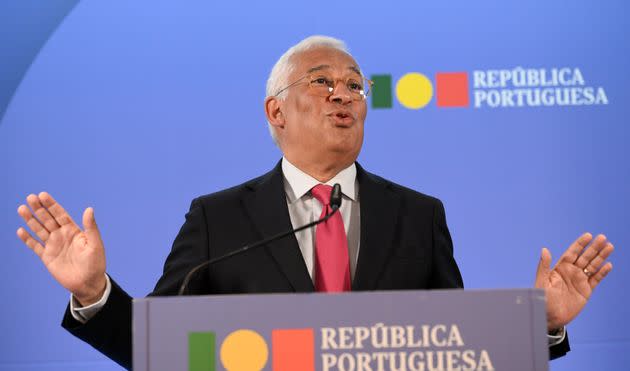
“Lithium is something that is so important for new technologies,” said António Costa Pinto, a research professor at the University of Lisbon and one of the country’s best-known political scientists. “It was an economic opportunity that Portugal could not pass up.”
Savannah’s proposal has attracted the most international attention, but the rush for lithium in Portugal — and the controversy surrounding it — actually began with a local company, Lusorecursos. The company won a government permit to begin prospecting for tin and tungsten in the foothills around Montalegre, but it was long plagued by allegations of fraud. Lusorecursos remained embroiled in lawsuits as recently as this year. The company did not respond to a request for comment.
Both Lusorecursos and Savannah got the green light from regulators in 2023 to move forward on mining.
Both companies were then dragged into the nationwide scandal that erupted in early November, when prosecutors announced an investigation into alleged corruption in the licensing process for the lithium mines and another clean-energy project, a hydrogen facility. While only his deputies were named in the probe, Prime Minister António Costa resigned in disgrace.
The companies said they were cooperating with investigators. Portuguese prosecutors asked a judge to annul Savannah’s environmental permit in February, but the courts have yet to do so.
In an email, Savannah said its own independent investigation in January “concluded that there was no evidence of wrongdoing by the company,” and noted that its work has continued “unencumbered” since the probe was first made public.
“Our teams are on the ground, our current drilling programme has produced some very positive results,” the company said in May.
If all goes according to plan, Savannah will complete its final feasibility study by the end of this year and advance to the last phase of the permitting process shortly afterward. Its prospecting work has continued.
‘They Want To Wear Us Down’
I arrived in Covas do Barroso less than two weeks after the prime minister resigned, with the goal of seeing the front lines of the European Union’s biggest “lithium war,” the hyperbolic term that journalists and advocates like to use for conflicts between miners and local opponents.
A giant banner calling for “no mining” fluttered in a traffic circle in Boticas roughly 20 minutes from the village. But the place seemed otherwise peaceful. An elderly farmer in a tweed cap waved as he brought his cattle to heel and let my car pass, as I questioned whether my rental could fit down the narrow cobblestone street where Fernandes lives.
I parked outside her house, and hopped into the front seat of her pickup. She was on duty, and she had comrades waiting for her.
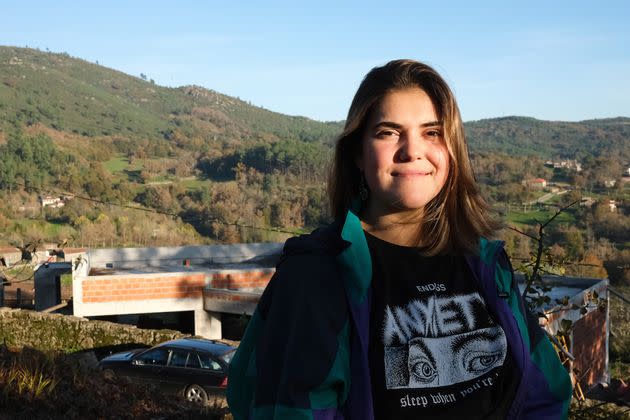
For months, prospectors working for Savannah had been showing up on property that opponents say is clearly outside the bounds of the tracts the company has purchased.
“They’re prospecting on my land without my permission,” said Catarina Scarrott, 46, a teacher from Covas do Barroso who now lives in London. “The limits of the land have been set up for 200 years or more, and everyone in the village knows what the limits of the land are.”
Scarrott is Fernandes’ cousin, and visits the village regularly. She said she could prove the land is hers, but by the time she could get a court to intervene, Savannah “will have prospected already.” The village of Covas do Barroso has at least three active lawsuits against Savannah, the company disclosed in its latest financial report to shareholders. But all the litigation is pending, part of a drawn-out legal process.
“They want to wear us down,” she said. “They know the court system is slow. They don’t care about the penalties they’ll get, because all they want to do is prospect. If they can’t prospect, they can’t prove they’ve got enough material to mine.”
The company told investors its lawyers said “any discrepancies in the land borders” would result in “the land returned” to the village. Savannah said a “generous offer has been made” to buy the remaining land, threatening to “use the Portuguese legal system to secure the land” if “it is not possible to secure the remainder of the land required by mutual agreement.”
At issue is the fact that a portion of the land surrounding Covas do Barroso is owned communally among the villagers. In Portugal, rural towns have traditionally exercised collective control over areas of land called “baldios,” which the communities can either manage themselves or oversee with the help of national conservation authorities.
“Savannah and its contractors have been working only on land which the Company either owns or has been granted permission to enter,” the company said in its emailed statement.
There was a gushing river between the village’s cobblestone street and the dirt road that leads through the communally owned lands where the Savannah workers had begun digging. Fernandes and her fellow anti-mining activists have feared that the mining will cause the underground reservoir to drop, wells to run dry, and any remaining water to become contaminated.
Last year, Savannah revised its initial pitch in regulatory documents to include more water protections. The company said its mine will operate as a “closed system” with “water treatment and sediment removal systems” in place to “ensure water quality on and off site is maintained.” In all, the company said it would tap less than 1% of the area’s groundwater, and that it had committed to daily monitoring for quality and cleanliness.
It also sweetened the deal for Covas do Barroso, according to João Cerejeira, an economist at the University of Minho who analyzed the Savannah project’s impacts.
Savannah said its concession only covers 0.5% of the Barroso agricultural region ― and “guaranteed” it would backfill and rehabilitate each area it mines, “permanently” impacting “less than 0.25%” of the heritage zone. The company abandoned plans to operate 24/7, promised to impose strict time and noise limits on the mining operation, and budgeted to build a new road so its trucks don’t cause traffic. Savannah also pledged annual donations to a local charity, and vowed to fund cultural research and breeding programs for native livestock.
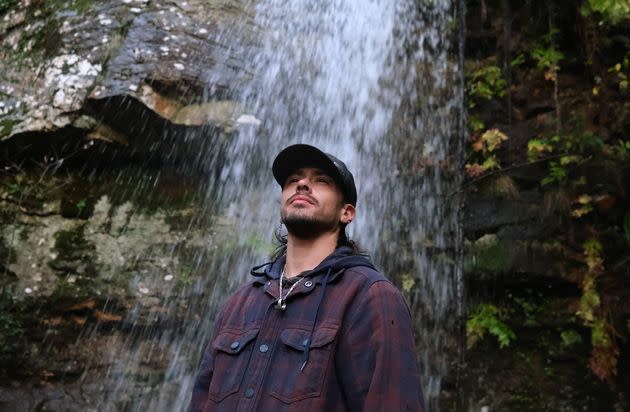
Such benefits were “not in the other versions” of proposals Savannah put forward, Cerejeira said.
“It’s an opportunity for the region,” Cerejeira said. “The region is losing population year by year. If they don’t have a project that will attract more people, more employment and more families to be living there... in the next decade the municipality will probably disappear. In terms of major services like post offices, schools and banks, you won’t have them because there won’t be enough humans.”
Fernandes and her cohort don’t see it that way. And if they couldn’t stop the mine altogether, their plan was to delay it as much as possible to at least test Savannah investors’ will to keep funding a company without revenues. Locals took turns playing sentinel, parking near the entrance to the communal baldio lands and preparing to summon reinforcements to block any mining trucks driving in to work.
Some days it proved effective, and Fernandes and her friends managed to keep the diesel trucks hauling prospecting equipment from reaching their destination. Other times, as I would later learn, it was a fruitless endeavor — and a distraction from necessary daily farming tasks.
When Fernandes saw the smoke on the horizon, indicating that the workers had begun boring into the bedrock before anyone could spot them, she seemed crestfallen and frustrated.
She drove off the paved street and onto the muddy road that ascends the pine-covered hillsides of the common lands surrounding the village. Roughly 100 feet up, she stopped the truck in front of two young people.
Mariana Riquito, 26, had first come to Covas do Barroso in September 2021 to study the local pushback for her Ph.D. thesis in sociology. Beside her stood Aurik Antunes, 33, a barber and artist who was also drawn here by the conflict, but found it so peaceful they decided to stay and set up a sanctuary retreat for queer people struggling with trauma.
They both hopped in the back of the pickup. Further up the road, we encountered a tall man in a fedora and long cargo shorts walking barefoot in the mud. Originally from Waterbury, Connecticut, Steven Silva Dias, 37, had returned to his parents’ native Portugal and found a sense of belonging in a local chapter of the Rainbow Gathering. The loose-knit, hippie-founded spiritual movement first cropped up in the U.S. in the 1970s to oppose the war in Vietnam. It survives today in the form of regular monthlong encampments where, for a full moon cycle, participants live off the land, bathe naked in streams, and engage in rituals of breathing and physical touch that are meant to erode ego.
Covas do Barroso’s mining conflict had drawn the Rainbow Gathering, which set up its temporary camp of tents and teepees in October. Dias, too, hopped in the back of the truck.
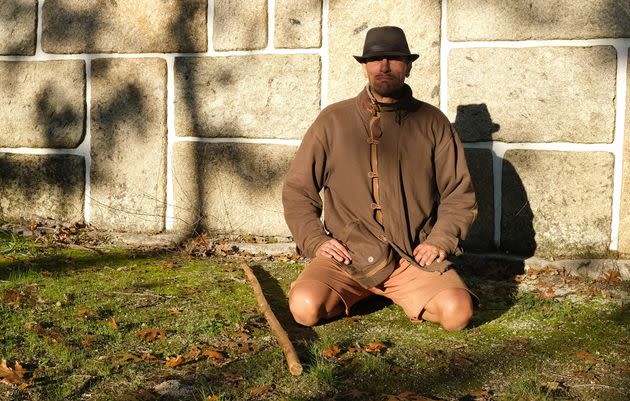
We drove another five minutes before reaching the ridge above where the workers were taking rock samples.
“See what they do?” Dias sneered.
The whole affair felt pretty benign. The workers made noise and cast up dust from machinery, but the operation was confined to a small area. The activists leered from the ridgetop above the work site, but did not approach or confront the crew. There seemed to be an understanding: If opponents blocked the road, the workers wouldn’t push through. But if the prospectors got started before advocates could obstruct their vehicles, no one would try to physically stop them.
Fernandes planned a show of force for the next day, which she organized in a private WhatsApp chat of local activists. She would lead a march of villagers to where Savannah had been taking samples that night, and prevent any more drilling — a demonstration of solidarity ahead of a town meeting where Fernandes hoped her neighbors would vote to pursue legal action against Savannah.
But first, she would make an discomfiting discovery: Her movement had a mole.
‘Come Quick. The Police Are Everywhere.’
My phone rang as I was finishing breakfast the next morning, about an hour before Fernandes’ march was scheduled to begin.
“Come quick. Please,” Fernandes said. “The police are everywhere.”
I drove fast down the twisting roads to Covas do Barroso. Two police SUVs blocked the road at the entrance to the village, but officers eventually got out of the way to let me pass.
About two dozen protesters were gathered at the defunct schoolhouse in the center of the village. We drove to the start of the dirt road going through the common lands, got out, and hiked the rest of the way to where the workers had been the night before.
There were no prospectors. But the police were circling the roads.
The crowd stood in the mud. Some eyed the surrounding ridges with binoculars, trying to spot miners. None appeared. Two Rainbow Gathering members began arguing in English over the ethics of smoking tobacco. A third rolled a cigarette by hand.
“I wonder if someone could explain why we’re here,” said a man wearing a wool poncho and carrying a large skin drum. “My brother says it’s to meet the land.”
Fernandes broke in and began giving a speech describing why her cohort believed a lithium mine would ruin this ancient farming community. She explained that Savannah had won a preliminary permit last May and could receive final approvals by next spring.
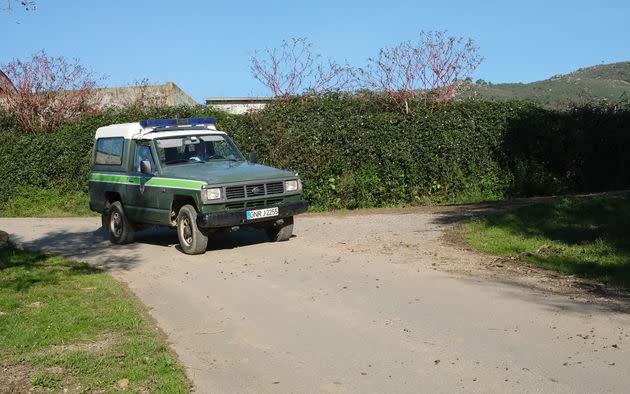
“We’re here to demonstrate that we have no fear, and to alert people to what’s going on,” she said.
Another Rainbow Gathering member asked if the lithium was going to Big Pharma. Riquito expounded on how electric cars were driving up demand for the metal, and that digging all that out of the ground here would destroy the local environment, without even adding that much to the global supply.
The poncho’d drummer asked if it was OK to read a message he was carrying from a tribe in Colombia. He read out the famous 1990 statement from the Kogi people to the world, warning humanity of nature’s wrath should industrial development continue apace.
Fernandes left the gathering early to complete some farm work. Her mind was elsewhere.
“Someone alerted the police,” she said. “Someone in the group.”
The police later told me it received a tip about a planned demonstration, and sent reinforcements to maintain “public order and tranquility.” But the National Republican Guard, as the country’s police force is known, acknowledged it had expanded patrols in Covas do Barroso generally as protests picked up over the past year.
“The increase in police presence in the village... can be justified by the presence of a climate of tension among the population, who in general were opposed to the entry of the lithium exploration company into the vacant land in the region, a situation which generated a lot of media attention nationally and internationally,” said Ana Isabel Morais, a spokesperson for Portugal’s National Republican Guard.
That night, Fernandes led a town meeting at the village hall. This was what the protest was setting the stage for, a show of force to fellow villagers that momentum was building against the mine. It seemed to work. The majority in attendance voted in favor of opposing the mine, and considered additional litigation to stop it. The vote didn’t translate into any specific legal action, making it mostly symbolic. But when Fernandes came home to find her husband, her daughter and her daughter-in-law sharing cheese, bread and wine by the fire, she was glowing with pride.
From that point on, she said, the village has kept at least one guard at the worksite where the prospectors had been that Friday in November, preventing the company from collecting its equipment or continuing its sampling at that location.
The Other Side
Not everyone was pleased.
Lucillia Mó, 60, was among nearly four dozen people in the village who Savannah says have sold the company a cumulative 100 plots as of last month. She couldn’t recall exactly how much land, or how much money she earned — it was a small parcel far from the village itself — but she said it was a “fair price.”
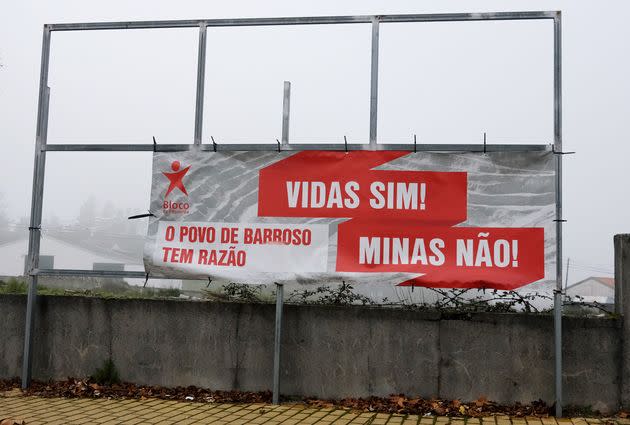
She has lived in Covas do Barroso her entire life, and can remember what it used to be like here. The schools were filled with kids. “A lot of people leave this area because there aren’t enough jobs,” Mó said. Her brother, she added, “already said if it goes ahead, he’d like to work in the mine.”
She brushed off concerns about water pollution and trucks, saying she was more concerned about the social isolation she’d felt after not joining the resistance movement.
“They stopped speaking to me,” Mó said. “I’m free to have my own opinion, and I have the right to decide to sell whatever land my parents left me if I need the money, so there’s no need for them to punish me.”
Fernandes said she had no issue with Mó’s decision to sell her land. The problem, she said, was that Mó’s land deal initially included part of the baldio she had no legal right to sell.
“We’re not against the people who sell,” Fernandes said. “We’re against the people who try to steal the baldio land.”
If anyone should be mad, Mó said, it’s villagers like her who never invited all these newcomers into Covas do Barroso.
“There are groups of people who come in. We don’t know who they are or what they do. It’s not that we’re against new people coming. But they were naked,” she said, referring to activists like the Rainbow Gathering group who bathed outside.
“A few months ago, I found two of them in one of my fields picking my chestnuts,” she added. “I asked them, ‘Who sent you here?’ And they couldn’t respond because they don’t speak Portuguese. I don’t like that.”
It’s unclear how many other villagers shared her sentiment. No patron at a crowded village bar and café one afternoon wanted to talk about the mine to an American journalist speaking through a translator, and the vote at the town meeting seemed to indicate widespread opposition.
“She is a very special person,” Fernandes said sarcastically of Mó.
The BBC, Reuters and Euronews had sent reporters to the remote village, and each came back with a similar David-vs.-Goliath narrative about resistance to the mine. A new documentary starring Fernandes premiered last week in France at the Cannes Film Festival.
I reached out to Savannah over a month before I was scheduled to visit Portugal, and the company, through an outside publicity firm, ultimately declined to meet with me during my visit.
I contacted the company again months later, asking if they would introduce me to some villagers who sold the firm their land. After weeks of going back and forth, Savannah arranged phone calls with two.
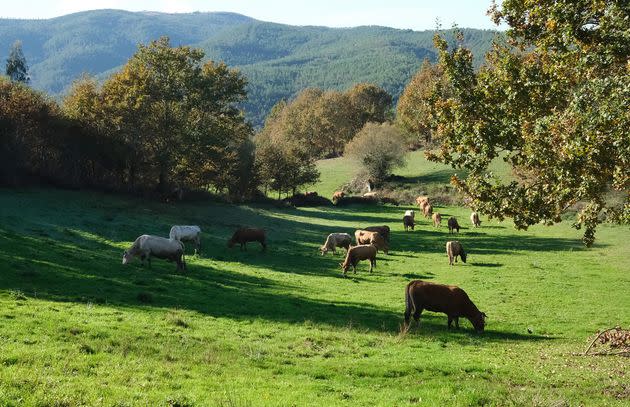
Maciel Alves sold Savannah 7 acres for 150,000 euros. A granite quarryman by trade, he said he understands the risks of lithium mining and believes the opposition is exaggerating the potential tradeoffs.
“The real risks are if it doesn’t go ahead,” Alves, 43, said by phone in March. “Things will stay the same and nothing will change. Our region will keep getting more and more abandoned.”
The mine, he said, would bring royalty payments and money.
“Everybody works for money, and it comes in handy,” he said.
That’s particularly true as the seasons and land he once counted on become less reliable. Alves remembered the blaze that nearly turned the village to ash.
“The wildfire took everything in Covas,” he said. “The land all burned down. The trees all burned down. My parent’s land, it all got affected.”
The flames couldn’t lick the cash in his checking account, he said.
On my final night in Boticas, after sharing dinner with Antunes, I drove back to the neighboring village where I was staying. The inky blackness of night was overpowering. In New York City, I rarely see that much darkness. I pulled onto the side of the road, parked the car, turned the lights off and got out. The cloudless sky was splattered with stars. I wondered how many generations of gazers had taken in this same view at this exact location. Finally craning my neck downward, I saw a blink of red light. Then another. Another. Along the horizon, on a distant ridgeline, a row of red lights flickering on and off. Wind turbines.
A week later, the Spanish government finalized its plans to shut down the Iberian Peninsula’s last nuclear reactors in the next few years, leaving Portugal, which shares a power grid with its neighbor, with little choice but to build a lot more batteries if the lights are going to stay on when the wind dies down and the sky turns dark. If the speed of deliberate change didn’t hasten, nature would set the pace. That would mean more wildfires, more “smokenados,” and more drought, like the latest one parching Iberia.
With lithium demand soaring year over year in the U.S., China and Europe, how long could this region really keep mining at bay?

 Yahoo Finance
Yahoo Finance 